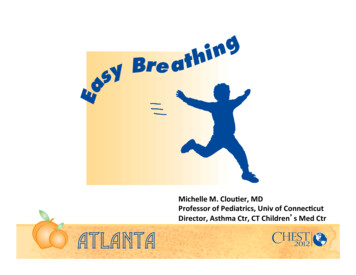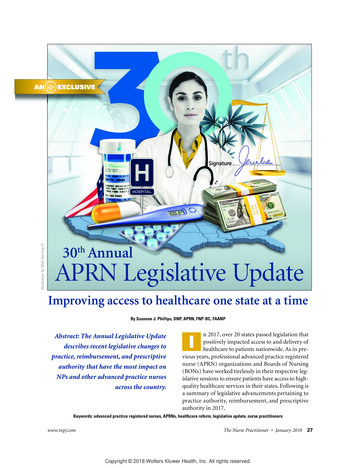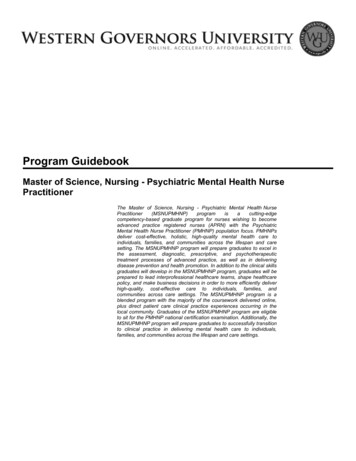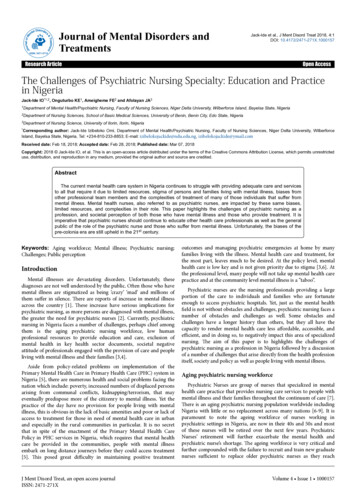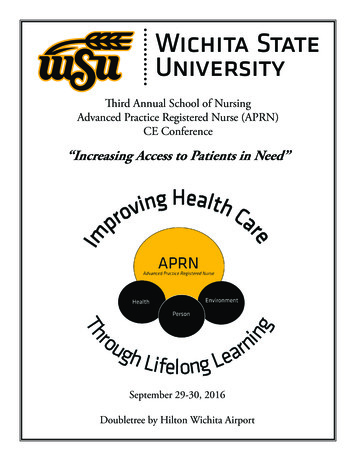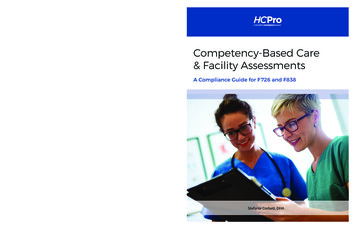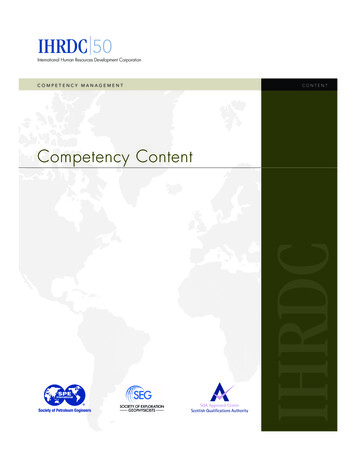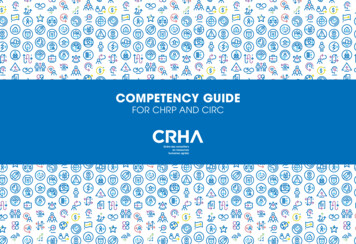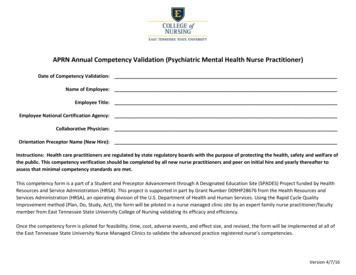
Transcription
APRN Annual Competency Validation (Psychiatric Mental Health Nurse Practitioner)Date of Competency Validation:Name of Employee:Employee Title:Employee National Certification Agency:Collaborative Physician:Orientation Preceptor Name (New Hire):Instructions: Health care practitioners are regulated by state regulatory boards with the purpose of protecting the health, safety and welfare ofthe public. This competency verification should be completed by all new nurse practitioners and peer on initial hire and yearly thereafter toassess that minimal competency standards are met.This competency form is a part of a Student and Preceptor Advancement through A Designated Education Site (SPADES) Project funded by HealthResources and Service Administration (HRSA). This project is supported in part by Grant Number D09HP28676 from the Health Resources andServices Administration (HRSA), an operating division of the U.S. Department of Health and Human Services. Using the Rapid Cycle QualityImprovement method (Plan, Do, Study, Act), the form will be piloted in a nurse managed clinic site by an expert family nurse practitioner/facultymember from East Tennessee State University College of Nursing validating its efficacy and efficiency.Once the competency form is piloted for feasibility, time, cost, adverse events, and effect size, and revised, the form will be implemented at all ofthe East Tennessee State University Nurse Managed Clinics to validate the advanced practice registered nurse’s competencies.Version 4/7/16
Scoring Scale1 Limited proficiency2 Acceptable3 ProficientN/A Not applicable at presentAny score below 2 requires a developmental plan.Independent APRN CompetenciesProfessionalismDemonstrates professional dress and decorum.Arrives to work on time.Uses professional communication skills with peers, colleagues, administration, faculty, staff, and providers ofcare. Demonstrates professionalism through respect toward patients. Precepts students and new employees when needed. Shows respect for diverse opinions when working collaboratively. Demonstrates accountability for actions. Volunteers when needed to help with administrative duties. Demonstrates honesty and trustworthiness. Committed to enhancing education and learning new evidence based care recommendations. Seen by others as a team player. Values opportunities to learn new tasks. Committed to the success of the clinic. Legible HandwritingPeer Reviewer Comments Related to this Domain: ProfessionalismPeerReview Validation Score(See Scale) PeerReviewerInitial:Date:Page 2Version 4/7/2016
Scoring Scale1 Limited proficiency2 Acceptable3 ProficientN/A Not applicable at presentAny score below 2 requires a developmental plan.Independent APRN CompetenciesPeerReview Validation Score(See Scale)I. Scientific FoundationsWhat is a competency?The Nurse Practitioner Core Competencies (NP Core Competencies) integrate and build upon existing Master’s andDNP core competencies and are guidelines for educational programs preparing NPs to implement the full scope ofpractice as a licensed independent practitioner. The competencies are essential behaviors of all NPs. Thesecompetencies are demonstrated upon graduation regardless of the population focus of the program and are necessaryfor NPs to meet the complex challenges of translating rapidly expanding knowledge into practice and function in achanging health care environment. Read more at: http://www.nonpf.org/?page 14Scientific Foundations Objectives:1. Critically analyzes data and evidence for improving advanced nursing practice. Give one example of competency #1:1. Synthesizes data from a variety of sources to make clinical decisions regarding appropriate management,consultation, and/or referral.3. Translates research and other forms of knowledge to improve practice processes and outcomes Give one example of competency #3:1.4. Develops new practice approaches based on the integration of research, theory, and practice knowledge. Give one example of competency #41.Page 3Version 4/7/2016
Scoring Scale1 Limited proficiency2 Acceptable3 ProficientN/A Not applicable at presentAny score below 2 requires a developmental plan.Independent APRN CompetenciesPeer Reviewer Comments Related to this Competency Domain: Scientific FoundationsPeerReview Validation Score(See Scale)PeerReviewerInitial:Date:II. LeadershipLeadership Objectives1. Assumes complex and advanced leadership roles to initiate and guide change. Give one example of competency #1:1.4. Advocates for improved access, quality, and cost effective healthcare. Give one example of competency #4:1.6. Communicates practice knowledge effectively, orally and in writing.7. Participates in professional organizations and activities that influence advanced practice nursing and/or healthoutcomes of population focus. Give one example of competency #7:1.1. Participates in community and population focused programs that promote mental health and prevent or reduce riskof mental health problems and psychiatric disorders.2. Advocates for complex patient and family medicolegal rights and issues.Page 4Version 4/7/2016
Scoring Scale1 Limited proficiency2 Acceptable3 ProficientN/A Not applicable at presentAny score below 2 requires a developmental plan.Independent APRN CompetenciesPeerReview Validation Score(See Scale)3. Collaborates with interprofessional colleagues about advocacy and policy issues at the local, state, and nationalrelated to reducing health disparities and improving clinical outcomes for populations with mental health problems andpsychiatric disorders.Peer Reviewer Comments Related to this Competency Domain: LeadershipPeerReviewerInitial:III. QualityQuality Objectives1. Uses best available evidence to continuously improve quality of clinical practice. Participates in the review of assigned UDS measures.Peer Reviewer Comments Related to this Competency Domain: QualityPeerReviewerInitial:Date:Date:IV. Practice InquiryPractice Inquiry ObjectivesPage 5Version 4/7/2016
Scoring Scale1 Limited proficiency2 Acceptable3 ProficientN/A Not applicable at presentAny score below 2 requires a developmental plan.Independent APRN CompetenciesPeerReview Validation Score(See Scale)2. Generates knowledge from clinical practice to improve practice and patient outcomes. Analyzes clinical guidelines for individualized application into practice. Formulates comprehensive differential diagnoses3. Applies clinical investigative skills to improve health outcomes. Assesses clinical practice via EHR and discerns gaps in care, barriers to care needing resolution, and recommendevidence based solutions for enhanced patient care outcomes.6. Analyzes clinical guidelines for individualized application into practice. Adapts interventions to meet the complex needs from aging, developmental, life transitions, co-morbidities,psychosocial, and financial issues.Uses knowledge of developmental stages to individualize care. Utilizes patient appropriate educational materials that address the language and cultural beliefs of the patient. Assesses and promotes self-care in patients with disabilities. Analyzes readiness to learn and tailors interventions accordingly. Monitors specialized care coordination to enhance effectiveness of outcomes. Facilitates patient-centered decision making about health. Applies principles of self-efficacy/empowerment in promoting positive behavior change. Evaluates the impact of life-transitions on the health/illness of patients and the health illness on the patients’families and communities.Plans palliative and end-of-life care as appropriate. Page 6Version 4/7/2016
Scoring Scale1 Limited proficiency2 Acceptable3 ProficientN/A Not applicable at presentAny score below 2 requires a developmental plan.Independent APRN CompetenciesPeerReview Validation Score(See Scale) Appropriately and timely addresses labs and diagnostic studies ordered and communicates with the patientplan of care. Provides a formal hand-off of patients of concern to other provider(s) when not available to ensure timelyfollow-up care.Peer Reviewer Comments Related to this Competency Domain: Practice InquiryPeerReviewerInitial:Date:V. Technology and Information LiteracyTechnology and Information Literacy Objectives1. Integrates appropriate technologies for knowledge management to improve health care. List 3 technologies used to manage patient’s healthcare.1.2.3.3. Demonstrates information literacy skills in complex decision making. Utilizes technology and applications for references in point of care.5. Uses technology systems that capture data on variables for the evaluation of nursing care.Page 7Version 4/7/2016
Scoring Scale1 Limited proficiency2 Acceptable3 ProficientN/A Not applicable at presentAny score below 2 requires a developmental plan.Independent APRN Competencies PeerReview Validation Score(See Scale)Obtains and accurately documents a relevant health history for patients of all ages using collateral informationas needed.Performs and accurately documents appropriate comprehensive and symptom-focused physical exams onpatients.Performs and adequately documents procedures in EMR Competently and independently performs, documents, and bills appropriately for 1, 2, and 3 or moreprocedures evidenced by EMR examples or return demonstration.Uses data from information systems to improve practice. Has patient office visit documented in electronic health record and finalized within 24 hours.Peer Reviewer Comments Related to this Competency Domain: Technology and Information LiteracyPeerReviewerInitial:Date:VI. PolicyPolicy Objectives1. Demonstrates an understanding of the interdependence of policy and practice. Adheres to East Tennessee State University policies and procedures2. Advocates for ethical policies that promote access, equity, quality, and cost.Page 8Version 4/7/2016
Scoring Scale1 Limited proficiency2 Acceptable3 ProficientN/A Not applicable at presentAny score below 2 requires a developmental plan.Independent APRN CompetenciesPeerReview Validation Score(See Scale) Give one example of competency #2:1.3. Employs opportunities to influence health policy to reduce the impact of stigma on services for prevention andtreatment of mental health problems and psychiatric disorders.Peer Reviewer Comments Related to this Competency Domain: PolicyPeerReviewerInitial:Date:VII. Health Delivery SystemHealth Delivery System Objectives1. Applies knowledge of organizational practices and complex systems to improve health care delivery. Follows facilities policies to reduce environmental health risks. Collaborates in planning for transitions across the continuum of care. Follows legal regulations for nurse practitioner practice, including reimbursement of services.6. Analyzes organizational structure, functions, and resources to improve the delivery of care. Reviewed JCCHC Organizational Structure and Phone Extension Trees Reviewed the contents of the supply room Located the AED equipment in the facilityPage 9Version 4/7/2016
Scoring Scale1 Limited proficiency2 Acceptable3 ProficientN/A Not applicable at presentAny score below 2 requires a developmental plan.Independent APRN Competencies Located the emergency cart and reviewed contents. Demonstrated use of electronics in patient roomsPeer Reviewer Comments Related to this Competency Domain: Health Delivery SystemPeerReview Validation Score(See Scale)PeerReviewerInitial:Date:VIII. EthicsEthics Objectives1. Integrates ethical principles in decision making. One example of Beneficence:1. One example of Nonmaleficence :1. One example of Autonomy1. One example of Justice1.3. Applies ethically sound solutions to complex issues related to individuals, populations, and systems of care evidenceby verbal recall.Page 10Version 4/7/2016
Scoring Scale1 Limited proficiency2 Acceptable3 ProficientN/A Not applicable at presentAny score below 2 requires a developmental plan.Independent APRN CompetenciesPeer Reviewer Comments Related to this Competency Domain: EthicsPeerReview Validation Score(See Scale)PeerReviewerInitial:Date:IX. Independent Practice CompetenciesIndependent Practice Objectives1. Functions as a licensed independent practitioner. Maintains current unencumbered licensure as an RN in Tennessee or compact state: Exp Date: Maintains current National Credentialing Certification: Exp Date: Maintains current licensure as an APN in Tennessee or other compact state every 2 years: Exp Date: Maintains current fitness to prescribe in the state on Tennessee every 2 years: Exp Date: Attains a minimum of two (2) contact hours of continuing education designed specifically to address controlledsubstance prescribing practices. The continuing education must include instruction in the TennesseeDepartment of Health’s treatment guidelines on opioids, benzodiazepines, barbiturates, and carisoprodol, andmay include such other topics as medicine addiction and risk management tools:Number of Hours Attained:Read Universal Precautions when prescribing opioids: http://www.opioidprescribing.com/overviewDate: Initiates a pain contact with all patients who are prescribed opioids.Date:Page 11Version 4/7/2016
Scoring Scale1 Limited proficiency2 Acceptable3 ProficientN/A Not applicable at presentAny score below 2 requires a developmental plan.Independent APRN CompetenciesPeerReview Validation Score(See Scale) Review Guidelines for prescribing opioids -elements.htmlDate: Review DIRE Tool for risk assessment http://integratedcare-nw.org/DIRE score.pdfDate: CSMD Registered and demonstrates usehttps://www.tncsmd.com/Login.aspx?ReturnUrl %2fdefault.aspxReview Opioid Risk Management http://www.painedu.org/soapp.aspDate: Review NIDA Screen Assist Tool: nmassist.pdf Review TN Dept. of Health Chronic Pain /attachments/ChronicPainGuidelines.pdfANCC Certification: Exp Date: ANCC Certified NP: Maintains 100 contact hours of continuing education relevant to the nurse practitioner’srole and population focus. (ANCC Half Category 1 and Half Category 2-6)ANCC Certified NP: Maintains 25 contact hours of pharmacotherapeutics to fulfill their Category 1 requirement. Date: ANCC Certified NP: Completion of a minimum of 1000 practice hours in population/specialty over the past 5years for re-certification.Maintains health care provider CPR certification approved by the American Heart Association every 2 years.Exp Date: Maintains privileging (as appropriate) Maintains current DEA licensure: Exp Date: Reviewed and understand the Tenn. Code Ann 63-7-123 regarding Prescription Rules and code/)Date:Page 12Version 4/7/2016
Scoring Scale1 Limited proficiency2 Acceptable3 ProficientN/A Not applicable at presentAny score below 2 requires a developmental plan.Independent APRN Competencies Reviewed and understand the treatment of pain policy. 2.pdf)Registered in CSMD (Demonstrated Access) (https://www.tncsmd.com/Login.aspx?ReturnUrl %2fdefault.aspx) Assesses patient decision-making ability—consults and refers appropriately. Assesses acute and chronic illnesses of the patient/family Identifies health and psychosocial risk factors impacting the patient’s healthcare. Identifies and plans interventions to promote health. Performs developmental screenings (all ages) Performs behavioral health screening (all ages) Performs mental health evaluations (all ages) Plans diagnostic strategies and makes appropriate use of diagnostic tools for screening and prevention, withconsideration of costs, risks, and benefits.Manages mental illnesses minimizing complications, promoting function, and enhancing quality of life. PeerReview Validation Score(See Scale)Date:Prescribes medications with knowledge of altered pharmacodynamics and pharmacokinetics with specialpopulations (infants, children, pregnant women, lactating women, and older adults.Prescribes therapeutic devices /durable equipment as needed.2. Demonstrates the highest level of accountability for professional practice. Follows current and emerging professional standards. Demonstrates novice to expert continuum of clinical practice.Page 13Version 4/7/2016
Scoring Scale1 Limited proficiency2 Acceptable3 ProficientN/A Not applicable at presentAny score below 2 requires a developmental plan.Independent APRN CompetenciesPeerReview Validation Score(See Scale)3. Practices independently managing previously diagnosed and undiagnosed patients.3a. Provides the full spectrum of health care services to include health promotion, disease prevention, healthprotection, anticipatory guidance, counseling, disease management, palliative, and end-of-life care.3b. Uses advanced health assessment skills to differentiate between normal, variations of normal, and abnormalfindings.3c. Employs screening and diagnostic strategies in the development of diagnoses.3d. Prescribes medications within scope of practice.3e. Manages the health/illness status of patients and families over time.4. Provides patient-centered care recognizing cultural diversity and the patient or designee as a full partner in decisionmaking.4a. Works to establish a relationship with the patient characterized by mutual respect, empathy, and collaboration.4b. Creates a climate of patient-centered care to include confidentiality, privacy, comfort, emotional support, mutualtrust, and respect.4c. Incorporates the patient’s cultural and spiritual preferences, values, and beliefs into health care.4d. Preserves the patient’s control over decision making by negotiating a mutually acceptable plan of care.1. Develops an age-appropriate treatment plan for mental health problems and psychiatric disorders based onbiopsychosocial theories, evidence-based standards of care, and practice guidelines.2. Includes differential diagnosis for mental health problems and psychiatric disorders.3. Assess impact of acute and chronic medical problems on psychiatric treatment.4. Conducts individual and group psychotherapy.Page 14Version 4/7/2016
Scoring Scale1 Limited proficiency2 Acceptable3 ProficientN/A Not applicable at presentAny score below 2 requires a developmental plan.Independent APRN CompetenciesPeerReview Validation Score(See Scale)5. Applies supportive, psychodynamic principles, cognitive-behavioral and other evidence based psychotherapy/-ies toboth brief and long term individual practice.6. Applies recovery oriented principles and trauma focused care to individuals.7. Demonstrates best practices of family approaches to care.8. Plans care to minimize the development of complications and promote function and quality of life.9. Treats acute and chronic psychiatric disorders and mental health problems.10. Safely prescribes pharmacologic agents for patients with mental health problems and psychiatric disorders.11. Ensures patient safety through the appropriate prescription and management of pharmacologic and nonpharmacologic interventions.12. Explain the risks and benefits of treatment to the patient and their family.13. Identifies the role of PMHNP in risk-mitigation strategies in the areas of opiate use and substance abuse clients.14. Seeks consultation when appropriate to enhance one’s own practice.15. Uses self-reflective practice to improve care.16. Provides consultation to health care providers and others to enhance quality and cost- effective services.17. Guides the patient in evaluating the appropriate use of complementary and alternative therapies.18. Uses individualized outcome measure to evaluate psychiatric care.19. Manages psychiatric emergencies across all settings.20. Refers patient appropriately.22. Uses outcomes to evaluate care.Page 15Version 4/7/2016
Scoring Scale1 Limited proficiency2 Acceptable3 ProficientN/A Not applicable at presentAny score below 2 requires a developmental plan.Independent APRN CompetenciesPeerReview Validation Score(See Scale)23. Attends to the patient- nurse practitioner relationship as a vehicle for therapeutic change.24. Maintains a therapeutic relationship over time with individuals, groups, and families to promote positive clinicaloutcomes.25. Therapeutically concludes the nurse-patient relationship transitioning the patient to other levels of care, whenappropriate.26. Demonstrates ability to address sexual/physical abuse, substance abuse, sexuality, and spiritual conflict across thelifespan.27. Applies therapeutic relationship strategies based on theories and research evidence to reduce emotional distress,facilitate cognitive and behavioral change, and foster personal growth28. Apply principles of self-efficacy/ empowerment and other self-management theories in promoting relationshipdevelopment and behavior change.29. Identifies and maintains professional boundaries to preserve the integrity of the therapeutic process.30. Teaches patients, families and groups about treatment options with respect to developmental, physiological,cognitive, cultural ability and readiness.31. Provides psychoeducation to individuals, families, and groups regarding mental health problems and psychiatricdisorders.32. Modifies treatment approaches based on the ability and readiness to learn.33. Considers motivation and readiness to improve self-care and healthy behavior when teaching individuals, familiesand groups of patients.Peer Reviewer Comments Related to this Competency Domain: Independent PracticePeerReviewerInitial:Date:Page 16Version 4/7/2016
Scoring Scale1 Limited proficiency2 Acceptable3 ProficientN/A Not applicable at presentAny score below 2 requires a developmental plan.Independent APRN CompetenciesPeerReview Validation Score(See Scale)Page 17Version 4/7/2016
Effectiveness of Child CareHEDIS/UDS ObjectivesAttention Deficit Hyperactivity (Child) Follow-Up Care for Children Prescribed ADHD Medication (HEDIS, 2016)Definition: The two rates of this measure assess follow-up care for children prescribed an ADHD medication:o Children age 6 -12 years have f/u visit within 30 days of rx.o Children age 6-12 years prescribed ADHD medication remain on medication for at least 210 days, 2 f/u visitsin 9 months after initiation of medication.Guideline: https://www.guideline.gov/content.aspx?id 36881Peer Reviewer Comments Related to this Domain: Effectiveness of Child CarePeerReviewerInitial:Date:Effectiveness of Care –Mental HealthHEDIS/UDS ObjectivesAlcohol Treatment Plans Initiation and Engagement of Alcohol and Other Drug Dependence treatment in adolescents and adults whohave alcohol dependence. (HEDIS, 2016)PCP visit after inpatient AOD hospitalization within 14 days.Alcohol treatment initiated within 30 days of AOD diagnosis.Documentation of alcohol treatment plan (HEDIS, 2016)Page 18Version 4/1/2016
Guideline: ry-care?ds 1&s alcohol and USPSTF FullRecommendation terventions-in-primary-care and CAGE Screening 2/78-79.htmDepression Antidepressant Medication Management in patient 18 and older (HEDIS, 2016) Patient remains on antidepressant for 12 weeks-6 months.Guideline: reening and USPSTF Recommendation pression-inadults-screeningDepression Screening Utilization of the PHQ-2 and PHQ-9 to Monitor Depression Symptoms for Adolescents and Adults (12 and older)(HEDIS, 2016) Follow up plan documented after each visit (UDS, 2015)Guideline: https://www.icsi.org/ asset/fnhdm3/Depr-Interactive0512b.pdf PHQ-2 and PHQ-9 Tools American FamilyPhysician: http://www.aafp.org/afp/2008/0715/p244.htmlMental Illness Follow-up Follow-up After Hospitalization for Mental Illness age 6 years and older within 7 days of hospitalization (HEDIS,2016)Guideline: id 48842Page 19Version 4/7/2016
Mental Health Referrals Mental Health Utilization (HEDIS, 2016)Guideline: http://www.who.int/publications/guidelines/mental health/en/SBIRT Utilizes Screening, Brief Intervention, and Referral to Treatment (SBIRT) (UDS, 2015)SBIRT Guideline: e/SBIRTSubstance abuse guideline: rdersSchizophrenia/Cardiovascular monitoring Cardiovascular Monitoring for People with Cardiovascular Disease and Schizophrenia age 18-64 (HEDIS, 2016) LDL-C measurement yearlyGuideline: ecommendationsSchizophrenia/Bipolar-Diabetes Diabetes Monitoring for People with Diabetes and Schizophrenia age 18-64 (HEDIS, 2016) Yearly diabetes screening test for patients on antipsychotics Yearly LDL-C and HbA1c for patient with Diabetes and SchizophreniaGuideline: ecommendationsSchizophrenia Medication Management Adherence to Antipsychotic Medications for Individuals age 19-64 with Schizophrenia (HEDIS, 2016) Dispensed and patient remained on antipsychotic at least 80% of treatment period.Guideline: ecommendationsPage 20Version 4/7/2016
Peer Reviewer Comments Related to this Domain: Effectiveness of Care—Mental HealthPeerReviewerInitial:Date:Effectiveness of Care –Child Mental HealthHEDIS/UDS ObjectivesAntipsychotics (Child MH) Metabolic Monitoring for Children and Adolescents on Antipsychotics (HEDIS, 2016)Guideline: AHRQ: d 48648&search Antipsychotic Agents orsAntipsychotics (Child MH) Use of Multiple Concurrent Antipsychotics in Children and Adolescents (HEDIS, 2016)Guideline: AHRQ: d 48647 orsAntipsychotics (Child MH) Use of First-Line Psychosocial Care for Children and Adolescents on Antipsychotics (HEDIS, 2016)Guideline: AHRQ : d 48689 orsPage 21Version 4/7/2016
Peer Reviewer Comments Related to this Domain: Child Mental HealthPeerReviewerInitial:Date:Effectiveness of Care –Medication ManagementHEDIS/UDS ObjectivesMedication Management Considers potentially Harmful Drug-Disease Interactions in the Elderly (HEDIS, 2016)Medication Management Guideline: https://www.guideline.gov/content.aspx?id 37826Drug interaction checker: kerMedication Management Use of High-Risk Medications in the Elderly (HEDIS, 2016) Considers renal failure, dementia, falls when prescribing medicationsAbout Beers Criteria: 02/pdf.Guideline: ctice.htmMedication Management Medication Reconciliation Post-discharge (HEDIS, 2016)AHRQ Guideline and Summary: d 48653Page 22Version 4/7/2016
Peer Reviewer Comments Related to this Domain: Effectiveness of Care—Medication ManagementPeerReviewerInitial:Date:Effectiveness of Care –Case ManagementHEDIS/UDS ObjectivesCase Management Guidelines: ardsOfPractice.pdfEmergency Department Utilization Appropriate Emergency Department Utilization (HEDIS, 2016)AHRQ HCUP Summary: ent Utilization Appropriate Inpatient Utilization—General Hospital/Acute Care (HEDIS, 2016) Utilizes measures to prevent hospitalizationAHRQ HCUP Summary: nt Readmissions Plan All-Cause Readmissions (HEDIS, 2016)Prevention measures to reduce the risk of inpatient readmission within 30 days.AHRQ HCUP Summary: http://www.hcup-us.ahrq.gov/nrdoverview.jspPage 23Version 4/7/2016
Peer Reviewer Comments Related to this Domain: Effectiveness of Care—Case ManagementPeerReviewerInitial:Date:Signature of EmployeeDate CompletedSignature of Manager/ReviewerDate CompletedPeer Assessment CommentsAPRN CommentsPage 24Version 4/7/2016
Developmental plan for scores 2.Domain(I- IX)CompetencyNumberDevelopmental Plan:Page 25Version 4/7/2016
Signature of EmployeeDate CompletedSignature of Manager/ReviewerDate CompletedPage 26Version 4/7/2016
ReferencesAmerican Diabetes Association. (2016). Standards of Medical Care in Diabetes—2016 Abridged for Primary Care Providers. Clinical Diabetes, 34(1),3-21.Belgrade, Miles. (2005). DIRE. Fairview Pain & Palliative Care Center. Retrieved from http://integratedcare-nw.org/DIRE score.pdfBoston University. (2015). Safe and effective opioid prescribing for chronic pain. Retrieved from http://www.opioidprescribing.com/overviewCenter for Disease Control and Prevention. (2005). Morbidity and Mortality Weekly Report (MMWR). Retrieved 17a1.htm?s cid rr5417a1 eLexis Nexis Public Solutions. (2015). Tennessee Code Unannotated. Retrieved from: l Committee for Quality Assurance. (2016). Healthcare Effectiveness Data and Information Set [HEDIS] Measures. rement/HEDISMeasures.aspxNational Organization of Nurse Practitioner Faculties. (2013). Population focused nurse practitioner comp
The Nurse Practitioner Core Competencies (NP Core Competencies) integrate and build upon existing Master's and DNP core competencies and are guidelines for educational programs preparing NPs to implement the full scope of practice as a licensed independent practitioner. The competencies are essential behaviors of all NPs.
